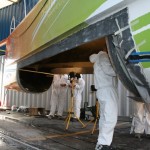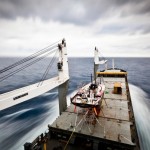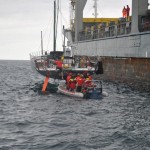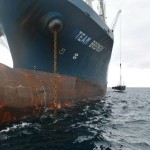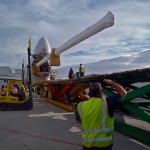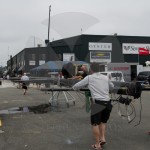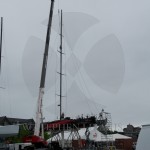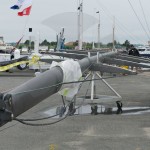The Volvo Ocean Race has revealed its anti-piracy plan, which will see the fleet transported by armed heavy lift ship from an undisclosed Safe Haven Port in the Indian Ocean and resume racing from a set-down point along the Sharjah coastline in the northern Emirates, within a day’s sailing of the Leg 2 finish in Abu Dhabi.
“This solution means we still have the exciting race finish into Abu Dhabi as always planned, while steering clear of the most dangerous waters off the Eastern African corridor” – Knut Frostad
Race organisers announced in August that the route for Legs 2 and 3 would be re-drawn because of the increased threat of piracy in the Indian Ocean. With the fleet set to depart Cape Town for the start of Leg 2 on Sunday, Race Director Jack Lloyd has made parts of the plan public for the first time.
The six boats will leave Cape Town as scheduled on Sunday, December 11 and continue to be tracked as normal until they reach a point in the Indian Ocean. From there, details about the boats’ location will be switched off to the public as they sail on to a Safe Haven Port. At that port, the boats will be loaded on to a ship protected by armed guards and featuring other security measures and transported to the northern Emirates.
Once unloaded, Race Management will decide where exactly to re-start the race for a short competitive sprint into Abu Dhabi, which is hosting the event from December 31 to January 14. The sailors will not be on board the ship.
The scoring system has been modified, so that 80 per cent of the points of Leg 2 are based on the race between Cape Town and Safe Haven 1 and 20 percent for the short sprint into Abu Dhabi. For Leg 3, the operation will be reversed, with a short sprint from Abu Dhabi at the start of the leg. The boats will go back on a ship and be transported again to a Safe Haven Port. From there, they will sail on as normal to the Leg 3 finish in Sanya, China.
Race Director Jack Lloyd said: “It is unfortunate that we have to take these measures but we have followed professional advice every step of the way. It is still very much a race around the world and we believe we have found a fair points system that will help make it an exciting sprint into Abu Dhabi.
“The teams all understand the situation and have given us their full support.”
Lloyd and Knut Frostad, the CEO of the race, have worked closely with Dryad Maritime Intelligence plus government agencies including European Union Naval Force Somalia (EUNAVFOR), UK Maritime Trade Operations (UKMTO) and the Maritime Security Centre, Horn of Africa (MSCHOA) as well as the sport’s governing body, the International Sailing Federation (ISAF).
Frostad said safety had always been the highest priority in getting the teams through the areas worst affected by piracy.
“Piracy is a threat to the entire race and the measures we are taking are designed to keep the sailors, the shore crew and the boats as safe as possible, while preserving the competitive nature of the race,” Frostad said.
“This solution means we still have the exciting race finish into Abu Dhabi as always planned, while steering clear of the most dangerous waters off the Eastern African corridor.”
Piracy is a well-organised and highly lucrative business and it has expanded into a vast area off the coast of Somalia. According to figures from Dryad Maritime Intelligence,1,181 seafarers were kidnapped by pirates in 2010.
Dryad’s Graeme Gibbon Brooks said pirate operations in the eastern part of the Indian Ocean had been significantly restricted.
“This factor as well as very careful planning has reduced the probability of an encounter to as low as reasonably possible,” he said. “But while the probability is small, the impact of an attack when it happens is extremely high.”
Like Abu Dhabi, Sanya is hosting the race for the first time. The Chinese tourist city in Hainan Province will open its Race Village from February 4-19.


